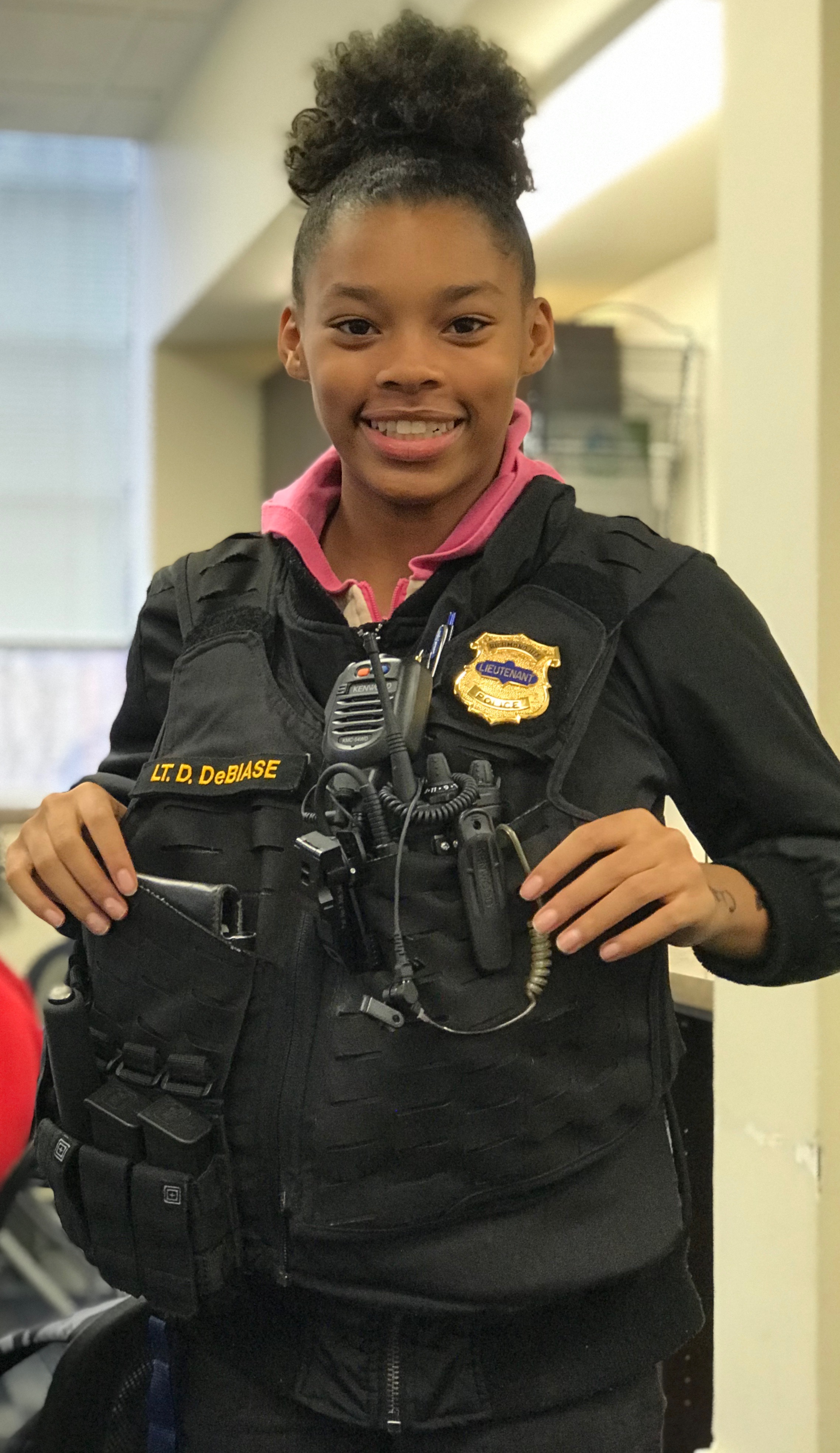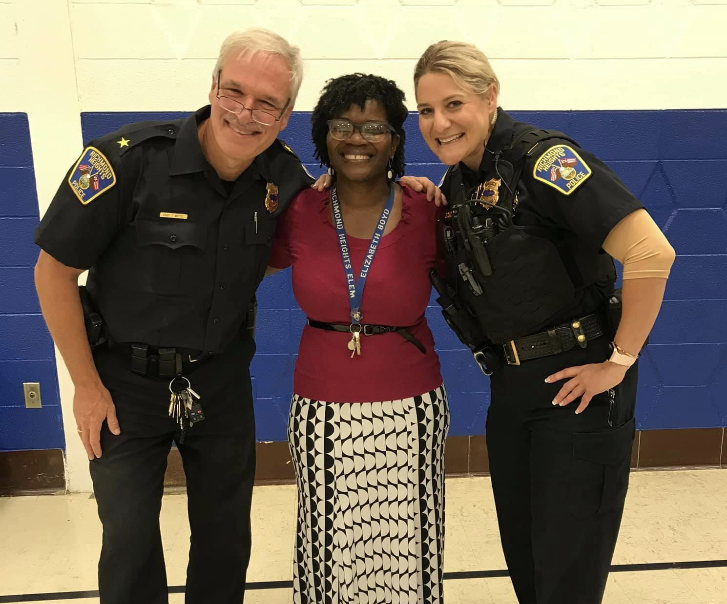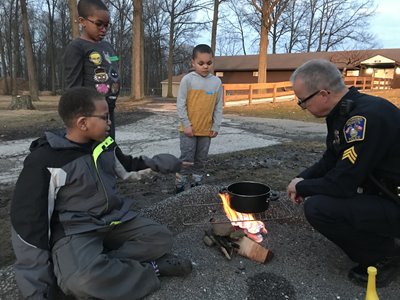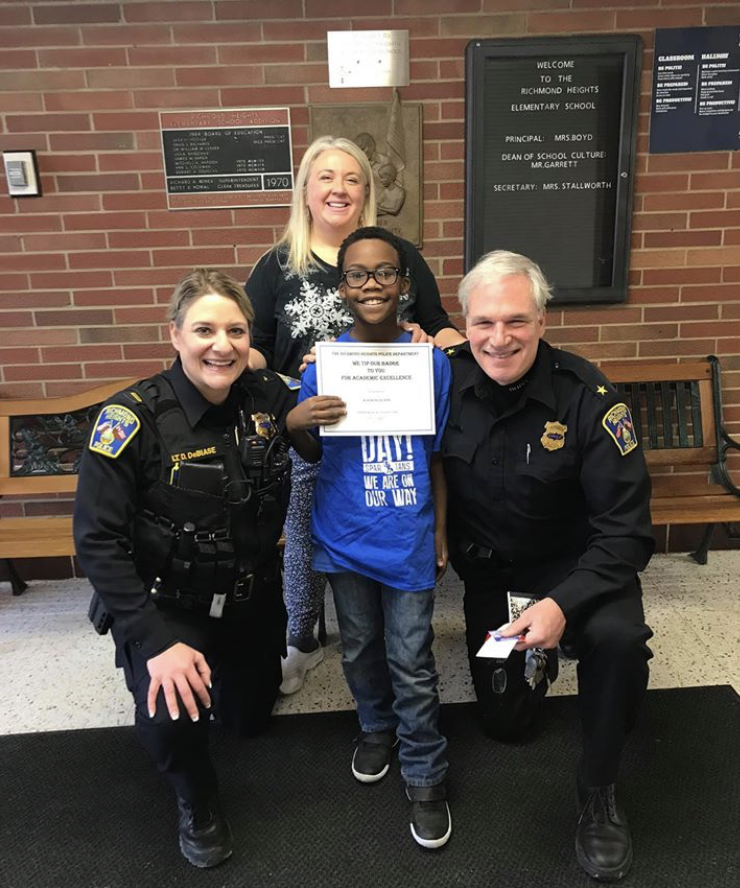
Richmond Heights Elementary student Amari Cloud tries on Lt. Denise DeBiase’s vest.
(Photos courtesy of Richmond Heights Police Department)
Richmond Heights police share successful programs
The Richmond Heights police chief calls his department an idea incubator, but what his team’s new youth outreach programs supply is something far more time-tested: community trust.
“If someone does something nice for your mother, you’re always going to have a soft spot for them, and I think it’s the same way with kids,” said Chief Tom Wetzel, who has led the 23-officer department since 2018. “If you do something nice for a child, the parent — even if the parent has a negative view of police — their heart is going to soften a little.”
The police department’s four banner programs reach out to children in kindergarten through high school and focus on a variety of youth interests.
“We want to make early connections with kids and maintain them,” Chief Wetzel said. “The hope is basically to build generational relationships where an officer, who may work for 35 years now, gets to know kids and then could actually meet their children, too.”
In short, the department wants to inspire long-term trust.
Throughout Ohio, other law enforcement agencies are likewise making investments — in ways simple and more complex — with the long view in mind.
“It’s about making the community a better place to live,” said Lt. Denise DeBiase, a 25-year veteran of the Richmond Heights department who spent 18 years as a DARE officer and now supervises multiple programs for teens.
“If more officers realized how much they can impact their community through youth outreach, we’d have so much more compliance in society,” she said. “People would be like, ‘You know what, if this officer is like Officer Denise, then maybe I should listen to them because I know it’s going to go OK.’ ”
A proactive approach
Richmond Heights Elementary is the first school that Principal Elizabeth Boyd has worked at where police officers initiate programming and regularly stop in just to connect, she said.
“Our police don’t come around just to keep the peace,” she said. “They are proactive in helping students to become productive citizens, and they recognize those who do well. It makes a difference.”

Chief Tom Wetzel, Elementary Principal Elizabeth Boyd and Lt. Denise DeBiase.
That difference has fostered a lot of good will among students, parents, public officials and other residents of the community of 11,000 northeast of Cleveland. It also has drawn recognition for the police department, which won “Agency of the Month” honors in July from the Ohio Association of Chiefs of Police and Law Enforcement Foundation.
Richmond Heights takes pride in its efforts and hopes these programs can serve as models for other agencies nationwide looking to deepen youth outreach:
Teen Ambassador Club
Through this club, Richmond Heights High School students interested in leadership learn about the public servants who power their community and how to be of service.
Lt. DeBiase, who runs the program, said the idea was suggested by Lindsay Carr, the northeast regional liaison for the Attorney General’s Office.
“She came in one day and said, ‘We’re trying to get programs started across the state to give teens opportunities and positive interaction with police,’” Lt. DeBiase said. “And I said, ‘Sign us up.’”
She worked with school officials to start the program, through which the students organize clothes and food drives and visit the police station, city offices and local courts. Once the COVID-19 pandemic wanes, ride-alongs with officers are planned.
“It’s a very positive experience when you’re actually seeing something and you’re not on the wrong side of the law,” Lt. DeBiase said. “You’re on the right side of the law.”
The club benefits all involved: The students learn real-life lessons and get a strong entry for their resumes or college applications, and the police department gets a lift from young people who understand how law enforcement works and can share that knowledge with others in the community.
Cop Scouts
Cop Scouts was one of those new ideas brought to Chief Wetzel that he embraced.
Sgt. Todd Leisure, a retired Marine and a former Cub Scouts leader, proposed this blend of Police Explorers and the Boy Scouts and Girl Scouts. The 9- to 12-year-olds who participate learn life and outdoors skills, police awareness and team building.

Sgt. Todd Leisure demonstrates the hot chocolate-making ability of pop-can stoves.
In one of the first meetings, Sgt. Leisure taught the kids (and their parents, who hang around) how to make mini stoves out of soda cans.
“People are excited, and they’re actually donating money, which is remarkable,” Chief Wetzel said. “They’re already paying their taxes. For them to dig into their pocket again tells you they believe in what we’re doing.”
Plans for the future include getting uniforms and applying for grant funding.
“These kids are going to form friendships with not only their fellow Cop Scouts but also the police officers,” Chief Wetzel said. “And it’s a great chance for the officers to give back to their communities. This is really a true calling to want to do this.”
Tip Our Badge
Tip Our Badge gives the Richmond Heights police a starring role in helping high-performing students, and their families, celebrate their accomplishments.
For this program, the department works with the primary and secondary Richmond Heights schools to recognize a student for academic excellence every two weeks. Teachers can nominate anyone for standout work, such as a science fair winner, a student who excels on a project or one with a high grade-point average.
The police department created a certificate and tapped local businesses to donate small rewards, such as restaurant vouchers and movie theater tickets.

Lt. Denise DeBiase and Chief Tom Wetzel congratulate Kalib Walton, 10, and teacher Meredith Connorton at Richmond Heights Elementary School.
“Because we are remote schooling, the police department brings those rewards to the student’s home,” said Boyd, the principal at Richmond Heights Elementary. “They create positive experiences for the child and the whole family.”
The city celebrates the student winner on the marquee in front of City Hall, and Chief Wetzel conducts a brief interview with the student — which, with parental permission, is posted on Facebook.
“We’ve got a pretty big, growing Facebook page,” said the chief, who created Tip Our Badge. “It’s fun because it gives students the chance to have family members come and say ‘nice job’ — this generation is very big on social media — and the outreach for us is amazing.”
People from as far away as California and Vietnam have visited the Facebook page to cheer on young relatives who were honored.
“We try to communicate on our Facebook page every single day in some fashion, which our community really likes,” the chief said. “So when you get people coming to congratulate a student, they see — or maybe they get curious about — what else we have going on.”
Police School Art Competition
Chief Wetzel conceived of the annual Police School Art Competition after realizing that most youth outreach programs focus on kids who excel in sports or academics.
“I wanted to connect with the artistic children in our schools,” he said.
So his department purchased frames and enlisted help from the high school art teacher. She provided 30 works, which were spread out in a conference room for officers to judge. The winning artists were invited to an awards ceremony, the newspaper covered it, and the art now hangs all over the station.
“The artwork, No. 1, is beautiful,” said the chief, who chose a favorite for his office. “And every day our officers see these works and are reminded of their connection to the children in our community.”
The many benefits
Principal Boyd wouldn’t hesitate to encourage law enforcement agencies thinking about starting or expanding youth outreach programs.
“I would say do it — make the effort to build those relationships because it definitely helps students,” she said. “They feel safer in school, safer even in their community, and we can work together to start to turn around that feeling that when police show up, that’s a bad thing. It’s not.”
Boyd told a story about a student who got into trouble outside of school, requiring intervention from school leaders and police.
“Because of the relationship we already had, we were able to work with that student and turn some things around,” she said. “The family was more receptive because they knew the officer. She wasn’t seen as a threat. She was seen as a positive.”
Some students who get to know the officers, Chief Wetzel said, will admire their strength and character as well as their exciting job, and decide that they, too, want to do police work when they grow up — effectively making youth outreach an important, if long-term, recruitment tool.
“Officer Donald Stocum, who we hired about six years ago, was one of my DARE students,” Lt. DeBiase said. “In fact, he was in my first DARE class, in 1998, when he was in fifth grade.”
In an effort to collect empirical data to prove that the programming produces results (beyond Stocum), Richmond Heights sent a survey to several hundred community members. Of those who responded, 80% gave the department high marks for increasing trust between students and officers.
“Most people, when they hear what we’re doing, don’t need any studies and data,” Chief Wetzel said. “You can just tell: These are kind acts that are going to resonate with people.”
And he believes all law enforcement agencies, no matter their size, should carry out youth outreach.
“This idea that ‘we’re too busy,’ I don’t buy that. I’ve been hearing it for 33 years,” Chief Wetzel said. “If you want to make it happen, you’ll find the time. And if we’re going to build bridges of trust for the long term, we’ve got to do it one girder at a time.
“That happens through programs like these.”